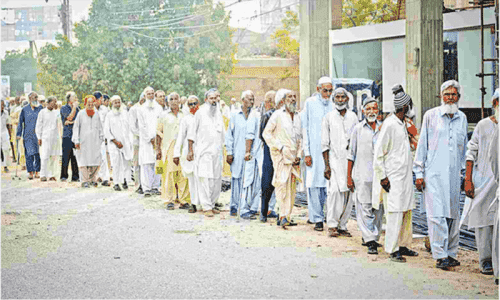ISLAMABAD: On Thursday, the Cabinet’s Economic Coordination Committee (ECC) approved significant modifications to the federal government’s pension scheme. These changes will take effect on July 1st, following formal approval by the federal cabinet.
Just two days before the fiscal year 2023–24 ended, the ECC, chaired by Finance Minister Muhammad Aurangzeb, also approved over Rs500 billion in additional and technical awards.
In order to fill the budget gap, the committee also approved a Ministry of IT summary and decided to revive the “Risk Coverage Scheme for SMEs.” The sum will be returned to the Universal Service Fund (USF) in the amount of Rs11.13 billion.
According to reliable sources, the modifications to the pension plan for civilians will take effect on July 1st, and the provisions pertaining to the military services will be implemented starting in the following fiscal year, or 2025–2026.
Additionally, the Finance Division received in-principle approval from the ECC to establish a Pension Fund. According to an official statement, the committee also approved the plan for the Defined Contributory Scheme, which will be effective for new entrants on July 1, 2024, and for members of the military forces on July 1, 2025.
According to Dawn, the summary indicates that numerous modifications to the pension plan were previously declared in the budget of the preceding year by Ishaq Dar, the finance minister at the time, but were not put into action.
The summary, filed by the Ministry of Finance, stated, “Amendments to the pension scheme were also accordingly announced in the budget speech for the financial year 2023-24,” without providing an explanation for their non-implementation.
According to the statement, the adjustments were made in accordance with the Pay and Pension Commission of 2020’s recommendations for improvements to the pension plan for current employees and pensioners in order to reduce future increases in pension costs without sacrificing the government’s pension philosophy.
The federal government has the authority and the “right of changing the provisions in these regulations regarding pay, allowance, leave, and pension, from time to time at its discretion, and of interpreting in case of dispute,” according to the finance ministry’s interpretation of the Civil Service Regulations.
According to draft regulations obtained by Dawn, federal government workers will be eligible for a gross pension that is calculated at 70% of the average pensionable earnings received over the final 24 months of service before retirement. Retirement of one’s own volition would come with consequences.
“After twenty-five years of service, a federal government employee may choose to retire. However, based on the number of completed months from the date of retirement to the date of superannuation, the employee shall be liable to a flat reduction rate of 3 percent per year in gross pension,” the rules stated.
A flat reduction of this kind in gross pension will not exceed 20 percent. This fine would only be applied in cases of voluntary retirement for members of the armed services and the civil aviation industry if retirement is requested or approved prior to the required amount of service.
The net pension determined upon retirement shall be referred to as the baseline pension for purposes of future pension increase methodology, and any pension increase will be based on the baseline pension. Until the federal government agrees to review and approve any new pensionary benefits, each increase will remain as a separate sum.
Furthermore, the current pension of current pensioners on the date of issuance of these amendments will be considered the baseline pension; additionally, the baseline pension is deemed to include restored commuted portion of pension as and when restored. The baseline pension will also be reviewed by a pay and pension committee every three years.
For a maximum of ten years following the spouse’s death or ineligibility, the surviving eligible family members may receive the Ordinary Family Pension. Nonetheless, the Ordinary Family Pension will continue to be admissible for the duration of the pensioner’s special or disabled children’s lives. The family pension will be available to the eligible children for ten years, or until the age of twenty-one, whichever comes first.
Furthermore, for 25 years following the passing of the spouse or the first recipient’s ineligibility, the Special Family Pension will be accessible to the surviving eligible family members. This pension is admissible for life in the event that the kid is disabled or has special needs.
According to Rule 12 of Pension Regulations Vol-1 (Armed Forces), 2010, “the rate of such pension for eligible recipients is enhanced to 50pc of last-drawn pension admissible to the first recipient for all ranks of armed forces/civil armed forces without minimum or maximum limits and transferable to all eligible heirs.”
If a federal pensioner is rehired in the public service after retiring at the age of fifty, regardless of the type of employment—contractual, regulatory, or otherwise—they will be able to keep their pension or continue to receive their salary for the duration of their new employment.








